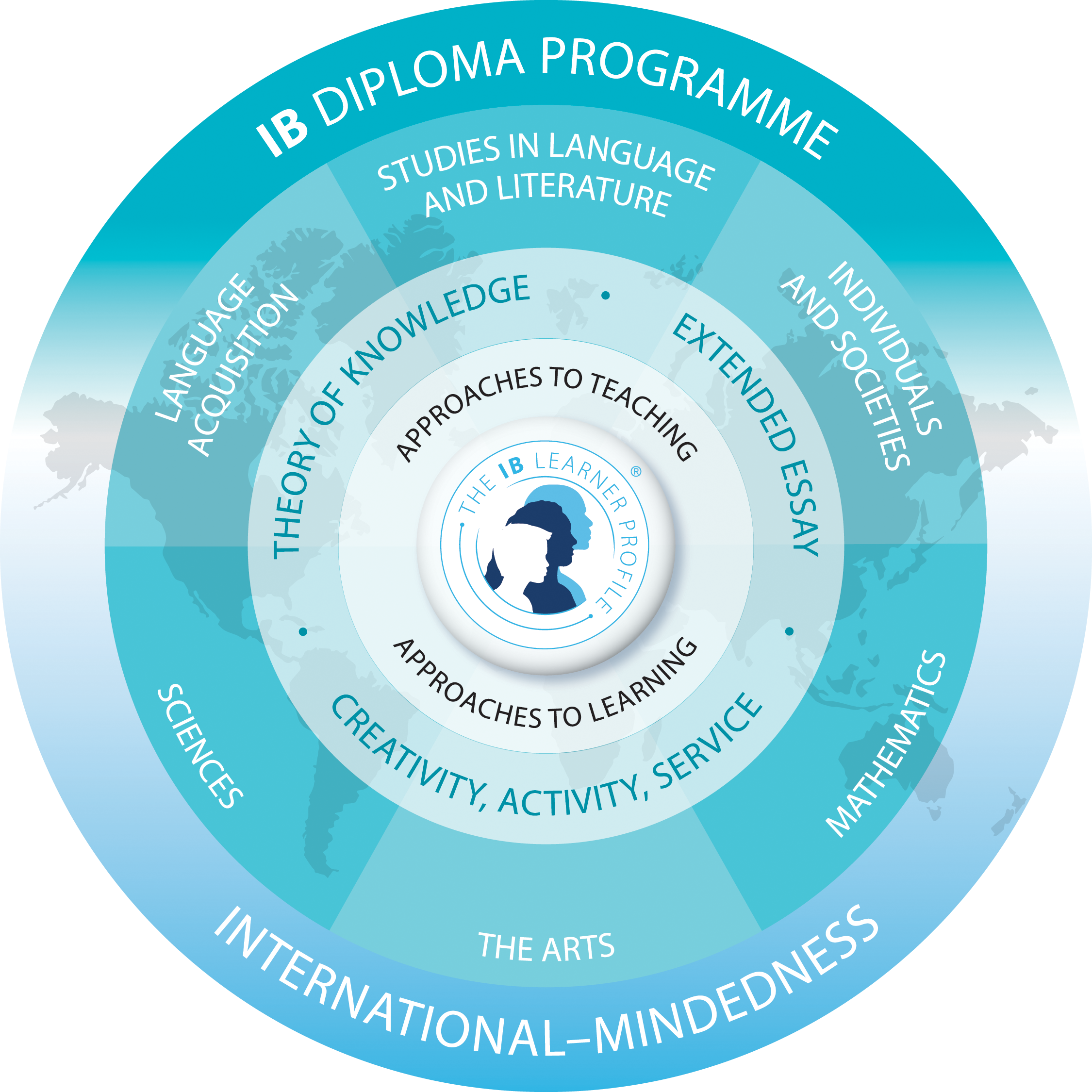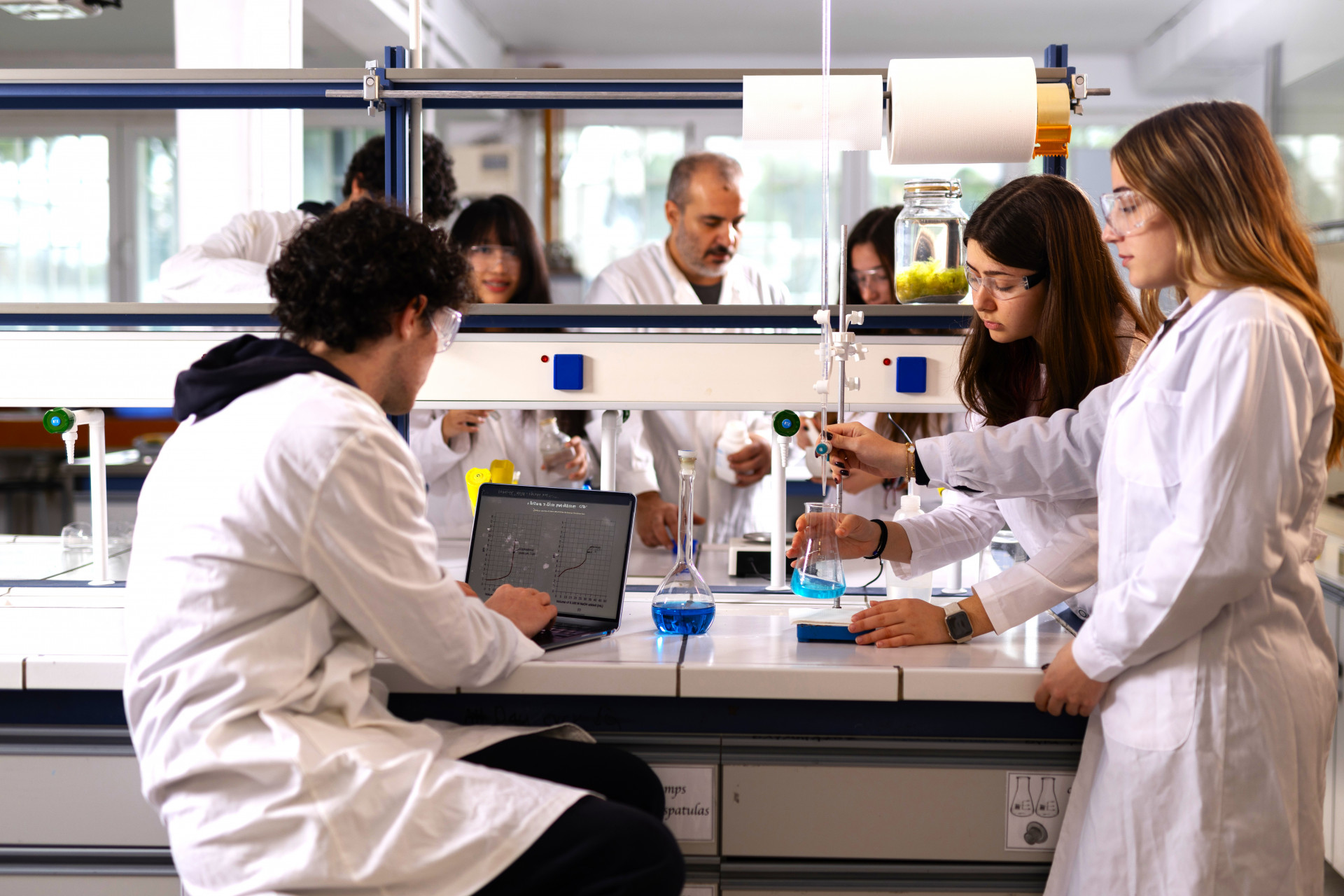OVERVIEW OF THE PROGRAMME
The International Baccalaureate® (IB) Diploma Programme (DP) is a two- year academically challenging and balanced programme of education with final external examinations that prepares students aged 16 to 19 for success at university and life beyond. It has been designed to address intellectual, social, emotional and physical well-being of students. The programme has gained recognition and respect from the world’s leading universities.
The Diploma Programme prepares students for effective participation in a rapidly evolving and increasingly global society as they:
- Develop physically, intellectually, emotionally and ethically
- Acquire breadth and depth of knowledge and understanding, studying courses from 6 subject groups
- Develop the skills and a positive attitude towards learning that will prepare them for higher education
- Study at least two languages and increase their understanding of cultures, including their own
- Make connections across traditional academic disciplines and explore the nature of knowledge through the programme’s unique Theory of Knowledge course
- Undertake in-depth research into an area of interest through the lens of one or more academic disciplines in the Extended Essay
- Enhance their personal and interpersonal development through Creativity, Activity & Service
The DP is preceded by the IB’s Primary Years Programme (PYP) and Middle Years Programme (MYP). The three programmes are philosophically aligned, each centred on developing attributes of the IB learner profile. The IB continuum is unique because of its academic and personal rigour, challenging students to excel in their studies and in their personal growth.
Its focus on international education is achieved by developing citizens of the world in relation to culture, language and learning to live together, building and reinforcing students` sense of identity and cultural awareness and fostering students` recognition and development of universal human values.
DIPLOMA PROGRAMME CURRICULUM FRAMEWORK
IB MISSION STATEMENT
The International Baccalaureate® aims to develop inquiring, knowledgeable and caring young people who help to create a better and more peaceful world through intercultural understanding and respect.
To this end the organization works with schools, governments and international organizations to develop challenging programmes of international education and rigorous assessment.
These programmes encourage students across the world to become active, compassionate and lifelong learners who understand that other people, with their differences, can also be right
The curriculum is made up of the DP core and six subject groups. The six subject groups are:
GROUP1: Studies in language and literature
GROUP2: Language acquisition
GROUP3: Individuals and societies

IB Diploma Programme students must choose one subject from each of five groups (1 to 5), ensuring breadth of knowledge and understanding in their best language, additional language(s), the social sciences, the experimental sciences and mathematics. Student may choose either an arts subject from group 6, or a second subject from groups 1 to 4 (see SUBJECT SELECTIONS).
At least three and not more than four subjects are taken at higher level, while the other subjects are taken at standard level.
In addition to disciplinary and interdisciplinary study, the Diploma Programme features three mandatory, core elements that broaden students’ educational experience and challenge them to apply their knowledge and skills. The three core elements are:
- The extended essay, which is an independent, self-directed piece of research, finishing with a 4,000-word paper.
- Theory of knowledge, in which students reflect on the nature of knowledge and on how we know what we claim to know
- Creativity, activity, service, in which students complete a project related to those three concepts.
The grades awarded for each course range from 1 (lowest) to 7 (highest). Students can also be awarded up to three additional points for their combined results on theory of knowledge and the extended essay (see the DP Programme Matrix - also listed below). Therefore, the highest total that a Diploma Programme student can be awarded is 45 points (see ASSESSMENT AND GRADING).
The major aim of the IB Diploma at ISA is to help students develop into life-long learners and confident, internationally-minded individuals. Since 1972 ISA has always implemented academic programmes, which provide opportunities and experiences that develop the whole individual. The introduction of the IB Diploma in 2000 simply reinforced many of the features, which the academic programmes at ISA were already designed to bring out and nurture in students.
The IB Diploma programme is not only highly valued by Universities but also by the students themselves.
IB DP Student Handbook 2025-2026 can be viewed here
DP student graduate testimonials may be reviewed at
https://isa.edu.gr/page/testimonials
University placements may be reviewed at
https://isa.edu.gr/page/university-placement
Candidates are allowed to retake exams in subsequent sessions, if they wish to improve their grade in one or more subjects.According to the IB Diploma General regulations document, Article 13 specifies that:
13.2 The IB Diploma will be awarded to a candidate provided all the following requirements have been met:
a. CAS requirements have been met.
b. The candidate’s total points are 24 or more.
c. There is no “N” awarded for theory of knowledge, the extended essay or for a contributing subject.
d. There is no grade E awarded for theory of knowledge and/or the extended essay.
e. There is no grade 1 awarded in a subject/level.
f. There are no more than two grade 2s awarded (HL or SL).
g. There are no more than three grade 3s or below awarded (HL or SL).
h. The candidate has gained 12 points or more on HL subjects (for candidates who register for four HL subjects, the three highest grades count).
i. The candidate has gained 9 points or more on SL subjects (candidates who register for two SL subjects must gain at least 5 points at SL).
j. The candidate has not received a penalty for academic misconduct from the Final Award Committee.
13.3 Candidates are allowed to retake exams in subsequent sessions, if they wish to improve their grade in one or more subjects.
Please click here to contact us


